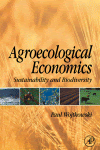ACDI/VOCA is an economic development organization that fosters broad-based economic growth, raises living standards, and creates vibrant communities.
As a leading proponent and analyst, Dr. Paul Wojtkowski shared with PAEPARD his vision of agroecology; both as an academic discipline and in how agriculture is practiced. A number of his books have affirmed the underlying motives, theories, and concepts. They have also proposed a large tally of quintessentially nature-friendly, farming practices. Although these efforts are deep in outlook, e.g., encompassing agriculture, forestry, and agroforestry, and broad in geographic scope, more insight is needed.
 His book of 2007 - Agroecological economics - not only expresses important differences between human-directed agroecology and natural ecology, it also holds key acceptance standards.
His book of 2007 - Agroecological economics - not only expresses important differences between human-directed agroecology and natural ecology, it also holds key acceptance standards.
Having observed agriculture in six continents and over 70 countries, Dr. Wojtkowski has seen what works and what doesn't. As a trained economist with advanced degrees in both agricultural and forest economics, he is able to take the next step; that of presenting agroecology as a fully-fledged science complete with its own economic underpinnings.
The name ACDI/VOCA dates back to the 1997 merger of Agricultural Cooperative Development International and Volunteers in Overseas Cooperative Assistance. Both were nonprofit international economic development organizations founded by the U.S. cooperative community.
Based in Washington, D.C., ACDI/VOCA has worked in 146 countries since 1963. Its practice areas are agribusiness, food security, enterprise development, financial services, and community development.
ACDI/VOCA is a leading implementing partner of USAID’s Feed the Future programming.
Many of these projects are task orders under the Support for Food Security Activities (SFSA) Indefinite Quantity Contract, an effort to reduce hunger and improve nutrition in eastern and southern Africa. This five-year IQC provides USAID an efficient, rapid-response mechanism to fund bilateral and regional agricultural development and food security programs in countries of the Common Market for Eastern and Southern Africa as well as Tanzania.
Current Projects
Many of these projects are task orders under the Support for Food Security Activities (SFSA) Indefinite Quantity Contract, an effort to reduce hunger and improve nutrition in eastern and southern Africa. This five-year IQC provides USAID an efficient, rapid-response mechanism to fund bilateral and regional agricultural development and food security programs in countries of the Common Market for Eastern and Southern Africa as well as Tanzania.
Current Projects
- Africa – Support for Food Security Activities (SFSA)
- Ethiopia – Agricultural Growth Program-Agribusiness and Market Development (AGP-AMDe)
- Ethiopia – Feed Enhancement for Ethiopian Development II (FEED II)
- Ghana – Agricultural Development and Value Chain Enhancement II (ADVANCE II) Project
- Global – African and Latin American Resilience to Climate Change program (ARCC)
- Kenya – Resilience and Economic Growth in the Arid Lands–Accelerated Growth
- Mali – USAID Cereal Value Chain (CVC) Project
- Tanzania – Tanzania Staples Value Chain (NAFAKA)
- Zambia – Production, Finance, and Improved Technology Plus (PROFIT+)
Having observed agriculture in six continents and over 70 countries, Dr. Wojtkowski has seen what works and what doesn't. As a trained economist with advanced degrees in both agricultural and forest economics, he is able to take the next step; that of presenting agroecology as a fully-fledged science complete with its own economic underpinnings.


No comments:
Post a Comment